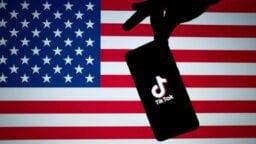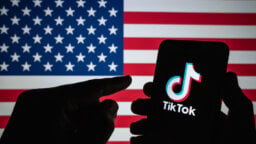TikTok is planning to take the US to court if a bill forcing parent company ByteDance to sell the company or face a ban in the country becomes law, news reports say.
TikTok’s plan to take the legal battle to the courts was reported on by both Bloomberg and The Information, after the US House of Representatives voted in favor of the bill on Saturday (April 20).
House representatives voted 360 to 58 for the bill, having previously voted in favor of it back in March. The new bill that passed Saturday came with some changes from the original version, including an expansion of the time period that ByteDance would have to sell TikTok’s US operations, from 165 days to one year.
The new bill was brought forward by Republic House Speaker Mike Johnson as part of a package of laws that includes new foreign aid for Israel, Taiwan and Ukraine. The aid had been held up in the House by grassroots Republicans increasingly uncomfortable with US funding for wars abroad.
The bill is expected to be voted in the Senate next week, and news reports indicate it has a high chance of success. If it passes through the Senate, it will require President Joe Biden’s signature to become law – and Biden has previously slignalled he will sign the bill into law if it’s passed by Congress.
In an internal memo sent TikTok staff after the House vote and obtained by The Information, Michael Beckerman, TikTok’s head of public policy for the Americas, wrote: “At the stage that the bill is signed, we will move to the courts for a legal challenge.”
Beckerman reportedly described the legislation as “unconstitutional” and said it was the product of an “unprecedented deal” between the Republican Speaker and the Democratic President.
TikTok has a track record of challenging in court previous attempts at banning the app. In 2020, it successfully sued the administration of Donald Trump after the then-President issued an executive order banning the platform from app stores and outlawing transactions between US citizens and ByteDance.
In 2022, TikTok sued the state of Montana after it became the first US jurisdiction to sign a TikTok ban into law. It also aided a separate suit against the law brought by TikTok users in the state. Both suits resulted in the law being blocked by judges.
Previous attempts at banning TikTok in the US were considered to be on shaky legal ground, as they could be interpreted as a violation of First Amendment (freedom of speech) rights, and because they singled out a single company for sanction. The authors of the new bill hope to avoid this obstacle by giving ByteDance the option to sell TikTok’s US operations, and by having the law cover any social media platforms controlled by “adversary countries.”
“It is unfortunate that the House of Representatives is using the cover of important foreign and humanitarian assistance to once again jam through a ban bill that would trample the free speech rights of 170 million Americans, devastate 7 million businesses, and shutter a platform that contributes $24 billion to the US economy, annually.”
TikTok
Opponents of the bill in the Senate, such as libertarian Republican Sen. Rand Paul of Kentucky, could try to strip out the TikTok portion of the foreign aid bill before it’s voted on, but such efforts are unlikely to be successful, Bloomberg reported.
“Before Congress rushes to begin banning and punishing every international company that does business in China, perhaps they should pause, take a breath, and ponder the ramifications of rapid, legislative isolationism with regard to China,” Sen. Paul posted on X on Friday (April 19).
With the bill ever closer to becoming law, TikTok has mobilized its users to help defeat the proposed legislation, much as it did with the previous version of the bill earlier this year. According to news reports, US users who search for “TikTok bill” are shown a banner calling on them to “Stop the TikTok Ban.” Clicking on the banner leads to a page where the user can enter their zip code, and be provided with contact information to their senators.
“It is unfortunate that the House of Representatives is using the cover of important foreign and humanitarian assistance to once again jam through a ban bill that would trample the free speech rights of 170 million Americans, devastate 7 million businesses, and shutter a platform that contributes $24 billion to the US economy, annually,” TikTok said in a statement on X, two days before latest House vote.
“This bill protects Americans and especially America’s children from the malign influence of Chinese propaganda on the app TikTok,” said the new bill’s author, Republican Rep. Michael McCaul of Texas.
“This app is a spy balloon in Americans’ phones,” he added, referring to the 2023 incident in which a purported Chinese spy balloon was spotted over the US and eventually shot down.
The divest-or-ban bill, as it’s come to be known, is the culmination of years of concerns – among lawmakers in the US and elsewhere – that TikTok’s parent company may be sharing user data with the government in Beijing, and may have the ability to censor anti-Chinese views, or spread misinformation favorable to China’s interests, among TikTok users.
“This bill protects Americans and especially America’s children from the malign influence of Chinese propaganda on the app TikTok. This app is a spy balloon in Americans’ phones.”
House Rep. Michael McCaul
TikTok CEO Shou Zi Chew has appeared multiple times in front of Congress to refute these allegations, saying that US user data is kept on Oracle servers in the US, and that the platform has spent $2 billion on data privacy efforts, Bloomberg noted.
“TikTok is an independent platform, with its own leadership team, including a CEO based in Singapore, a COO based in the US and a Global Head of Trust & Safety based in Ireland,” the company said in 2022, as quoted by The Guardian.
A number of prominent figures in high tech have come to TikTok’s defense, arguing that the attempt to ban or force a sale of a prominent platform sets a bad precedent
“In my opinion, TikTok should not be banned in the USA, even though such a ban may benefit the X platform,” X (formerly Twitter) owner Elon Musk wrote in a post on Friday. “Doing so would be contrary to freedom of speech and expression. It is not what America stands for.”
Meredith Whittaker, President of encrypted messaging service Signal, was stronger in her criticism, describing the effort to ban TikTok as being “f***ked.”
“Please take a moment to consider what’s happening here,” she wrote on X. “Abuse of surveillance powers is about to be enshrined in US law at the same time that a bill to force TikTok to sell to US buyer or be banned is moving forward, justified in part via ‘data privacy’.”
Whittaker was referring to the recent extension of the Foreign Intelligence Surveillance Act (FISA), which expanded the ability of US intelligence agencies to compel certain businesses to hand over the communications of US citizens without a warrant.
TikTok’s legal problems are mounting even as the platform faces an ongoing dispute with Universal Music Group, whose recorded and published music has disappeared from the platform over the past several months as the two companies failed to come to a licensing agreement.
Most recently, some music from Taylor Swift, who is signed to UMG on both the recorded music and publishing side, began to reappear on the platform, despite there being no sign of an agreement between TikTok and UMG.Music Business Worldwide




